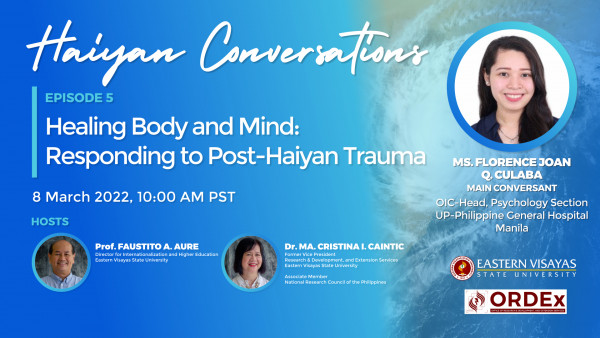Haiyan Conversations Episode 05: Healing Body and Mind: Responding to Post-Haiyan Trauma

Resource Speaker

Ms. Florence Joan Q. Culaba
Topic:
Main Conversant |
This HAIYAN CONVERSATION is set at the beginning of the 8th year after Super Typhoon Haiyan last November 8, 2013, considered the strongest typhoon ever recorded (Lagmay et al., 2014). Several countries have experienced super typhoons, and to that, diverse ways have been formulated to recover sustainably to build disaster-resilient communities.
Eastern Visayas State University is located in Tacloban City, Philippines, the city severely hard-hit by said super typhoon that resulted in 6,000 deaths and affected more than 14 million people (Walch, 2018). Natural disasters like typhoons are not new in the Philippines and still steadily increasing (Almazan et al., 2018). Disasters risk reduction has been an essential priority of the country. However, resilience discourse is still not the common language in the Philippines’ disaster risk reductions. Hence, a high level of casualties was observed during Typhoon Haiyan (Walch, 2018).
Nevertheless, survivor’s resiliency has been observed to be strongly adaptive, and the communities’ coping mechanism was high even in the face of adversity (Hechanova et al., 2016). The Philippine government took disaster risk reduction management seriously, which led to fewer casualties by allocating resources to build disaster resilient communities and reduce population exposure and vulnerability (Alcayna et al., 2016).
After a few years, much lesson learned and good practices has been adopted. The Philippine context and other regions are also significant for planning, improving disaster risk reduction, and program management, primarily on extreme events similar to Typhoon Hainan.
Anent to this, this series of lectures will revolve around how our community was able to build disaster resilience and make it better, how these solid recovery programs that considered sustainable interventions made our community more adaptive. Good practices, strategies, and framework management from other regions will be discussed to contribute to national and local policy planning.
After registering, you will receive a confirmation email containing information about joining the meeting.